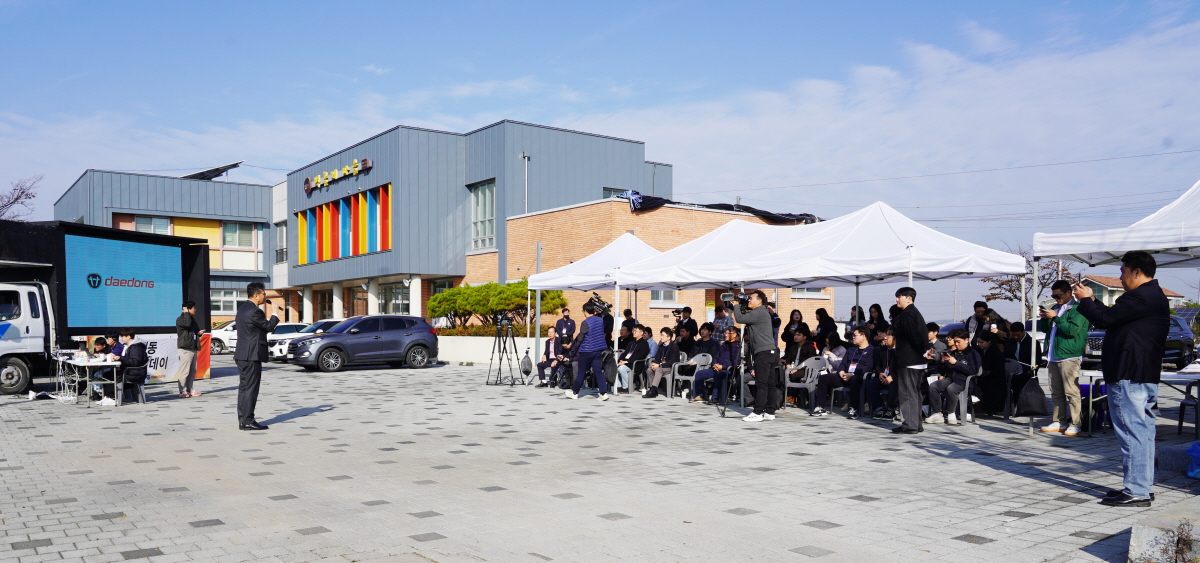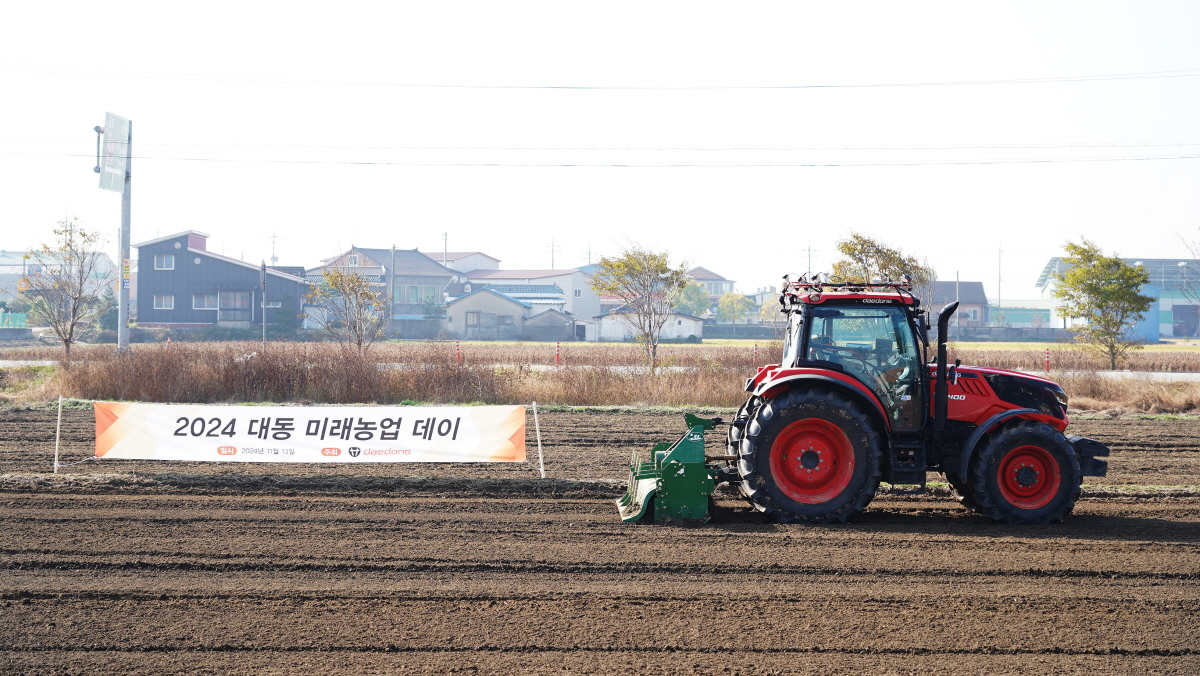Daedong hosts “2024 Future Agriculture Day” to usher in a new era of AI-powered agriculture
Daedong hosts “2024 Future Agriculture Day” to usher in a new era of AI-powered agriculture
- Future agricultural technology powered by AI can reduce fatigue, minimize human error, and increase work efficiency as well as productivity
- Daedong is hoping to advance precision agriculture, develop multipurpose agricultural robots capable of autonomous farming, and promote the robotization of agricultural machinery
- Farmers participating in precision agriculture in 2024 saw a 7% decrease in fertilizer usage and a 6.9% increase in rice yield, which increased income by KRW 7.58 million
- Test group proved the excellence of transport robots, including lower fatigue levels from work and better usability in agricultural landscapes... Launching in 2025
- Daedong also unveiled an on-device AI tractor with a vision sensor engineered for autonomous farming... Launching in 2026
Daedong (Co-CEOs Kim Jun-sik and Won Yu-hyun), a leader in future agriculture, hosted the “2024 Daedong Future Agriculture Day” on November 13 in Gimje-si, Jeollabuk-do, to unveil its future agriculture technology powered by AI, which the company is developing for the “AI transformation of agriculture in Korea.”
Daedong is accelerating its development of future agriculture technology capable of ▲reducing fatigue with added labor support, ▲minimizing human error (worker mistakes), and ▲maximizing work efficiency as well as productivity across the entire agricultural cycle by incorporating AI into agriculture. The company is “robotizing agricultural machinery,” including tractors, combines, rice transplanters, etc., to enable autonomous farming, and it is developing multipurpose agricultural robots used in dry fields and fruit farming, which already have a mechanization rate of 60%. Daedong is also looking to push its precision agriculture services along to maximize the harvest of high-quality agricultural products while minimizing the use of resources with smart farming technology that provides solutions according to the growth rate of each crop determined based on agricultural data. To this end, the company established Daedong AI Lab, a subsidiary specializing in AI robot software, under Daedong Agtech, the Group’s platform and solution company, this year. Then, in order to push the robot business further forward, Daedong Mobility created a new subsidiary, Daedong Robotics, with KIRO.
At the event on November 13, Daedong announced an AI-powered (1) precision agriculture commercialization strategy, (2) autonomous driving transport robot, (3) on-device AI tractor, and (4) mid- to long-term direction for AI agriculture, promoting Daedong's AI agriculture technology and products and also sharing its vision for the future to help elevate the company’s reputation as a leader company in future agriculture.

■ Full-scale commercialization of precision agriculture to start next year... Target is to secure 36,500 farming households by 2029... Economic impact could be KRW 1 trillion
Daedong announced the results from its demonstration with the Korea Central Association of Fields Co-op and its mid- to long-term plans to strategically commercialize its precision agriculture solutions. In January of this year, Daedong signed an MOU with the Korea Central Association of Fields Co-op[i] (hereinafter referred to as “KCAF Co-op”), and supplied precision agriculture solutions to 12 farms cultivating rice or soybeans in Gimje, Jeollabuk-do, Jangseong, Jeollanam-do, Sangju, Gyeongsangbuk-do, and Icheon, Gyeonggi-do, across a total farmland area of 60ha.
The largest farm to use Daedong’s precision agriculture solution was a 10ha rice paddy in Gimje, Jeollabuk-do. This year, the farm used approximately 4,650kg in fertilizers, which was 7% less, and rice yield was approximately 6,100kg, which was 6.9% higher, compared to other specialized farms in the same area and region that did not use any of Daedong’s precision solutions. Considering that the total rice yield in Gimje in 2024 is expected to drop by 5% compared to 2023 due to abnormal weather and pests, the farm using precision agriculture solutions from Daedong managed to increase its yield by more than 16% compared to all farms in Gimje. When converted into monetary value, the farm that deployed Daedong’s solutions used 7% less fertilizer, saving KRW 620,000 (KRW 1,750/kg) in procurement costs, and increased rice yield by 6.9%, adding KRW 6.96 million in sales (purchase price per kg: KRW 1,753), which netted an income of approximately KRW 7.58 million.

Daedong plans to help improve agricultural production and launch a precision agriculture distribution project in earnest next year. A (1) “plot information digitization solution” using drone footage, a (2) “customized agricultural management service” using farm data analysis, (3) a “precision agricultural solution” tailored to crop growth, and 4) a “smart agricultural work agency platform” are four products designed to support the company’s plans for more efficient means of agriculture and improved work productivity. To do so, in 2025, Daedong will launch a precision agriculture beta service to local governments in Korea to demonstrate the value of its technology, and in 2026 and 2027, the company will expand the service to include larger agricultural corporations such as agricultural cooperatives and agricultural associations. Ultimately, the goal is to build an ecosystem for precision agriculture services and secure 36,500 farms using precision agriculture solutions by 2029.
This corresponds to approximately 4.0% of the total number of farming households in Korea (926,000; total number of farming households in 2023 was 999,000 according to Statistics Korea) in 2029.
■ Goal is to focus on transport robots next year, then develop a multipurpose agricultural robot that can carry out autonomous farming tasks
Meanwhile, Daedong demonstrated an autonomous driving transport robot scheduled for release in the first quarter of next year, and also unveiled an environmental awareness robot that collects agricultural data for machine learning at an apple orchard in Byeoksan-myeon, Gimje-si. The company developed two robots - (1) an autonomous transportation robot and (2) a wired following transportation robot, focused on minimizing user input - to solve the inconvenience of workers having to continuously operate agricultural machinery to transport fruits while harvesting them.
With the autonomous driving transport robot, Daedong proved that it can autonomously follow workers while maintaining a certain distance, stop when an obstacle is detected, load 11 fruit boxes, up to 300kg, into its loading bin, and autonomously move to a designated location in the mapped orchard after harvesting. It also demonstrated how easy it is to move fruit boxes using a lift and dump function, and then showed how the robot can autonomously move back to where the harvesting is ongoing. By doing so, Daedong proved that its transport robot can minimize worker input compared to existing transport carts powered by an internal combustion engine, which are all manually operated, thereby increasing the concentration and efficiency level of workers. The company also highlighted the fact that its robot presents a lower risk of rollover accidents because it does not require a worker to be on board the robot, and the fact that it produces no smoke or noise because the robot is electric, and therefore alleviates worker fatigue.
Along with a demonstration featuring its transport robot, Daedong unveiled an autonomous data collection robot used for developing a multipurpose agricultural robot capable of autonomous farming when attached to various work modules designed for transportation, pest control, harvesting, weeding, or spraying. This vision system-based autonomous driving robot demonstrated its ability to (1) identify specific workers and follow them, and (2) operate as part of a fleet using multi-robot control technology. Daedong plans to develop an on-device AI platform that collects agricultural environmental data in various ways, which includes this robot, to enable autonomous farming by agricultural machinery and robots, and to load the platform onto other multipurpose agricultural robots as well.
■ Daedong reveals an industry-first on-device AI tractor... Clear recognition of farmland and obstacles using vision sensors
As part of its vision to “robotize agricultural machinery,” Daedong unveiled an on-device AI tractor - the first of its kind - engineered to perform autonomous farming work, which is scheduled to launch in 2026. This model is capable of level-4.5 autonomous driving according to automation standards for agricultural machinery farming work announced by the Korean Agency for Technology and Standards in 2022. Thanks to vision sensors and AI image technology, the camera sensor attached to the tractor recognizes the external environment, which could include farm roads/farmland boundaries and obstacles, on its own compared to existing lidar-based autonomous agricultural machinery, resulting in more accurate identification of objects. Moreover, with technology that automatically recognizes work attachments, it takes less time to set up the equipment and helps establish an agricultural work plan autonomously.
On a related note, Daedong deployed tractors to collect data on autonomous operations across the country to develop on-device AI tractors and collected over 3 million agricultural environment images, the largest number among all domestic agricultural machinery companies, by driving across farmland for over 2,500 hours over two years. Daedong expects that on-device AI tractors will save more than 20% in farming time due in large part to higher work efficiency, and also increase production by 5~10% given the higher precision in farming tasks.
________________________________________
[i] What is the Korea Central Association of Fields Co-op?
Established in 2009 as part of the policy to create and foster agricultural management organizations, the Korea Central Association of Fields Co-op is an association of agricultural management organizations with more than 25 farmers (members) who cultivate at least 50ha around the farmland. There are 600 member field co-ops nationwide, and they jointly manage all or part of the crop cultivation processes used at a total of 107,000ha (approx. 323 million pyeong) of arable farmland in Korea.
